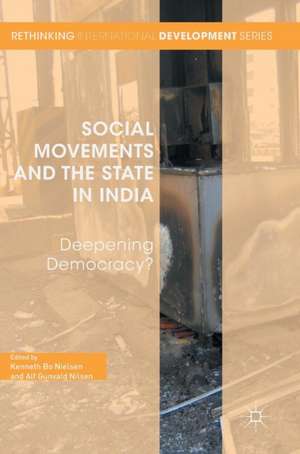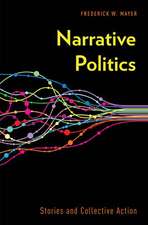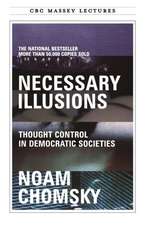Social Movements and the State in India: Deepening Democracy?: Rethinking International Development series
Editat de Kenneth Bo Nielsen, Alf Gunvald Nilsenen Limba Engleză Hardback – 20 dec 2016
Din seria Rethinking International Development series
- 20%
 Preț: 632.80 lei
Preț: 632.80 lei -
 Preț: 388.72 lei
Preț: 388.72 lei -
 Preț: 387.75 lei
Preț: 387.75 lei -
 Preț: 392.60 lei
Preț: 392.60 lei -
 Preț: 387.75 lei
Preț: 387.75 lei - 18%
 Preț: 780.82 lei
Preț: 780.82 lei - 15%
 Preț: 646.62 lei
Preț: 646.62 lei -
 Preț: 390.63 lei
Preț: 390.63 lei -
 Preț: 394.51 lei
Preț: 394.51 lei -
 Preț: 391.61 lei
Preț: 391.61 lei - 15%
 Preț: 638.58 lei
Preț: 638.58 lei -
 Preț: 394.87 lei
Preț: 394.87 lei -
 Preț: 381.98 lei
Preț: 381.98 lei - 18%
 Preț: 896.39 lei
Preț: 896.39 lei -
 Preț: 394.51 lei
Preț: 394.51 lei -
 Preț: 386.81 lei
Preț: 386.81 lei - 15%
 Preț: 648.24 lei
Preț: 648.24 lei - 15%
 Preț: 500.73 lei
Preț: 500.73 lei -
 Preț: 218.38 lei
Preț: 218.38 lei -
 Preț: 389.31 lei
Preț: 389.31 lei - 18%
 Preț: 783.35 lei
Preț: 783.35 lei -
 Preț: 396.40 lei
Preț: 396.40 lei -
 Preț: 387.58 lei
Preț: 387.58 lei
Preț: 729.53 lei
Preț vechi: 889.68 lei
-18% Nou
Puncte Express: 1094
Preț estimativ în valută:
139.59€ • 146.14$ • 115.51£
139.59€ • 146.14$ • 115.51£
Carte tipărită la comandă
Livrare economică 05-19 aprilie
Preluare comenzi: 021 569.72.76
Specificații
ISBN-13: 9781137591326
ISBN-10: 1137591323
Pagini: 309
Ilustrații: XIII, 297 p. 2 illus.
Dimensiuni: 148 x 210 x 23 mm
Greutate: 0.5 kg
Ediția:1st ed. 2016
Editura: Palgrave Macmillan UK
Colecția Palgrave Macmillan
Seria Rethinking International Development series
Locul publicării:London, United Kingdom
ISBN-10: 1137591323
Pagini: 309
Ilustrații: XIII, 297 p. 2 illus.
Dimensiuni: 148 x 210 x 23 mm
Greutate: 0.5 kg
Ediția:1st ed. 2016
Editura: Palgrave Macmillan UK
Colecția Palgrave Macmillan
Seria Rethinking International Development series
Locul publicării:London, United Kingdom
Cuprins
1. Social Movements, State Formation and Democracy in India: An Introduction; Alf Gunvald Nilsen and Kenneth Bo Nielsen.- 2. The Slow-Motion Counterrevolution: Developmental Contradictions and the Emergence of Neoliberalism; Radhika Desai.- 3. The Politics of Caste and the Deepening of India’s Democracy: The Case of the Backward Caste Movement in Bihar; Jeffrey Witsoe.- 4. Transnational Dalit Feminists in-between the Indian State, the UN and the Global Justice Movement; Eva-Maria Hardtmann.- 5. Feminist Efforts to Democratize Democracy: Insights from Four Decades of Activism in India; Manisha Desai.- 6. Women Workers, Collective Action and the “Right to Work’ in Madhya Pradesh; Nandini Nayak.- 7. Turbid Transparency: Retelling the Story of the Right to Information Act in India; Prashant Sharma.- 8. Rights based laws in practise: A view from Southern Orissa; Minati Dash.- 9. Re-making Labour in India: State Policy, Corporate Power and Labour Movement Mobilization; Michael Gillan.- 10. Blind Alleys and Red Herrings? Social Movements, the State, Class Alliances and Pro-Labouring Class Strategy; Jonathan Pattenden.- 11. Disappearing Landlords and the Unmaking of Revolution: Maoist Mobilization, the State and Agrarian Change in northern Telangana; Jostein Jakobsen.- 12. Conclusion; Kenneth Bo Nielsen and Alf Gunvald Nilsen.
Notă biografică
Kenneth Bo Nielsen is an anthropologist working at the Department of Sociology at the University of Bergen, Norway, and also coordinates the Norwegian Network for Asian Studies, hosted by the University of Oslo’s Centre for Development and the Environment. His current research focuses on social movements and land dispossession in India.
Alf Gunvald Nilsen is Associate Professor of Sociology at the University of Bergen, Norway, and Senior Visiting Researcher at the University of the Witwatersrand, South Africa. His work focuses on social movements in the global South, with a particular concentration on India.
Alf Gunvald Nilsen is Associate Professor of Sociology at the University of Bergen, Norway, and Senior Visiting Researcher at the University of the Witwatersrand, South Africa. His work focuses on social movements in the global South, with a particular concentration on India.
Textul de pe ultima copertă
Questions of the extent to which social movements are capable of deepening democracy in India lie at the heart of this book. In particular, the authors ask how such movements can enhance the political capacities of subaltern groups and thereby enable them to contest and challenge marginality, stigma, and exploitation. The work addresses these questions through detailed empirical analyses of contemporary fields of protest in Indian society – ranging from gender and caste to class and rights-based legislation. Drawing on the original research of a variety of emerging and established international scholars, the volume contributes to an engaged dialogue on the prospects for democratizing Indian democracy in a context where neoliberal reforms fuel a contradictory process of uneven development.
Caracteristici
Scrutinises the aids and constraints that social movements face in advancing collective projects Offers rich and stimulating accounts engaging with the broader question of democracy in India across a range of sites of contention Gives a broad thematic coverage of the implications of past and present struggles for the nature of India's democracy

















